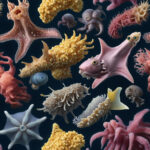Exploring the Depths: Scientists Uncover 14 New Deep-Sea Species, Including Popcorn-Shaped Parasite
The ocean covers more than 70 percent of Earth’s surface, yet scientists have formally identified less than a fraction of the species that call it home. Recently, a team of marine biologists embarked on a groundbreaking expedition to uncover the mysteries lurking in the depths of the ocean. Their efforts have led to the discovery of 14 new deep-sea species, each more fascinating than the last.
Among the most intriguing finds is a popcorn-shaped parasite that has left scientists both astounded and perplexed. This tiny creature, resembling a morsel of popped corn, attaches itself to deep-sea fish using tiny hooks and feeds on their blood. While the discovery of a new parasite may not seem glamorous, it sheds light on the intricate and often bizarre relationships that exist in the deep sea.
In addition to the parasite, the team also identified several new species of bioluminescent fish that light up the dark waters with their dazzling displays. These fish, with their vibrant colors and mesmerizing patterns, serve as a reminder of the beauty and diversity that thrive in the most remote corners of our planet.
But the discoveries did not stop there. The scientists also encountered a species of deep-sea jellyfish that pulsates with a hypnotic glow, illuminating the surrounding waters like a living lantern. This finding not only adds to our knowledge of deep-sea ecosystems but also raises intriguing questions about the evolutionary adaptations that have allowed these creatures to thrive in such extreme conditions.
Perhaps most remarkably, the team stumbled upon a species of giant squid, a creature of legend that has long captured the human imagination. With its massive tentacles and otherworldly appearance, the giant squid serves as a powerful reminder of the vast and uncharted world that lies beneath the ocean’s surface.
The discovery of these 14 new species underscores the importance of continued exploration and conservation efforts in our oceans. As we strive to better understand the complexities of deep-sea ecosystems, we also have a responsibility to protect these fragile environments from the threats of pollution, overfishing, and climate change.
In a world that is constantly evolving, with new technologies and scientific advancements pushing the boundaries of what we know, it is essential that we continue to support and invest in research that uncovers the hidden wonders of our planet. The deep sea, with its mysteries and marvels, serves as a poignant reminder of the awe-inspiring beauty and resilience of the natural world.
As we look to the future, let us remember the importance of curiosity, exploration, and stewardship in preserving the wonders of the deep sea for generations to come.
deep sea, marine biology, new species, conservation, exploration












